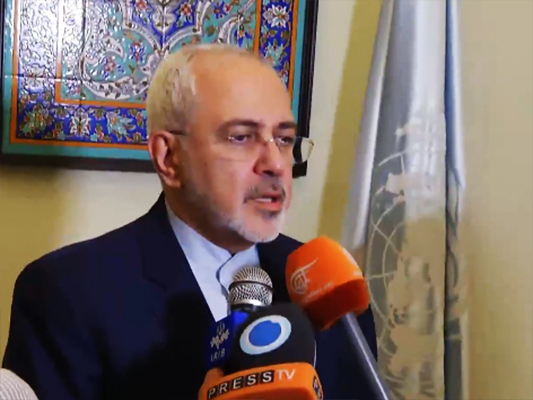Speaking to reporters upon his arrival in New York, Mohammad Javad Zarif stressed that all parties to the deal, officially called the Joint Comprehensive Plan of Action (JCPOA), must remain committed to the terms of the agreement.
Zarif is in New York to attend the UN high-level political forum on sustainable development on Friday.
“Unfortunately up until now, the United States, while remaining at the very least possible level compliant with the agreement, has failed to observe, in times, the letter and mostly the spirit of the agreement by not allowing Iran to enjoy the full benefits of the nuclear deal. We believe they need to reconsider that position, because it is not conducive to the sustainability of the agreement,” Zarif said.
Zarif argued that the West’s policy of pressure against Iran has proved to be ineffective, adding, “The JCPOA is a multilateral agreement that was the result of many years of negotiation.”
“It was also the result of many years of pressure. After all those pressures failed to bring about the results that were expected from those who were imposing pressure on the Iranian people, there was no other choice but to reach a negotiated settlement,” added the Iranian minister.
“I think at the end of the day, everybody will see that the agreement will represent an outcome that was the best possibility for all concerned [parties],” he pointed out.
Zarif’s comments come on the second anniversary of the landmark deal, which was inked on July 14, 2017, between Tehran and the five permanent members of the United Nations Security Council – the United States, Britain, France, China and Russia – plus Germany. The JCPOA was later endorsed by a UN Security Council resolution.
Since January 2016, when the JCPOA took effect, the International Atomic Energy Organization, which monitors the technical implementation of the deal, has in numerous reports confirmed Iran’s compliance.
During his presidential campaign, US President Donald Trump described the nuclear accord with Iran as a “disaster” and vowed to unilaterally scrap it.
While he has not carried out that threat, his administration is conducting a “review” to see whether the provision of sanctions relief to Iran – a US commitment under the deal – is in America’s “national interest.”
On Tuesday, the European Union’s foreign affairs chief Federica Mogherini described the historic nuclear deal with Iran as an international agreement that “does not belong to one country,” noting that all the parties to the deal “have the responsibility to make sure that this continues to be implemented.”
In response to a question by the Press TV correspondent about the possibility of any meeting between Iranian and American officials during the New York visit, Zarif said, “For this visit, no meetings have been planned. I plan to meet not with US officials, but with members of the wider intellectual community that have impact on US policy-making.”
Battling Terror in Mideast
Zarif pointed to the ongoing campaign against terrorism and extremism across the Middle East, particularly in Iraq and Syria, and noted that the current crisis is mainly caused by the US interventionist policies in the region.
“The nightmare that we are facing in the region is a consequence of many years of intervention and short-sighted policies by the US in the region which has resulted, as expected, in the exacerbation of extremism and terrorism in our region,” he said.

The foreign minister said Iran has been “in the forefront of fighting terrorism and extremism in the region” and expressed satisfaction over the fact that the people and governments of Iraq and Syria have succeeded in retaking their territories.
“This menace … has been the result of short-sighted policies from the outside and unfortunately, negative policies by countries in the region who continue to sponsor, to support and provide arms and money to terrorists and extremist organizations and unfortunately provide the ideology of hatred and exclusion which lies at the heart of these extremist movements,” Zarif noted.
The remarks come after Iraqi Prime Minister Haider al-Abadi formally declared victory of the country’s forces over the Daesh Takfiri terrorist group on Monday, one day after the country’s military and Popular Mobilization Forces took full control of the strategic city of Mosul.
Zarif underlined Iran’s determination to help end violence in Syria through a negotiated settlement at Astana peace talks, adding, “We support a comprehensive ceasefire throughout Syria, excluding obviously terrorist and extremist organizations, particularly Daesh and al-Nusra.”
“We have been in consultation with Russia and Turkey in the Astana process and outside the Astana process in order to make sure that successful implementation of our agreements would continue and would further be enhanced in order to make sure that the suffering of the Syrian people is reduced and hopefully move forward to humanitarian assistance to all Syrians throughout Syria,” the top diplomat pointed out.
Syria’s warring parties have attended five rounds of peace talks brokered by Iran, Russia and Turkey in the Kazakh capital, Astana. The Astana discussions produced a memorandum of understanding on de-escalation zones in Syria that sharply reduced fighting in the Arab country.
The negotiations are aimed at bringing an end to the foreign-backed militancy in Syria, which began in March 2011.
